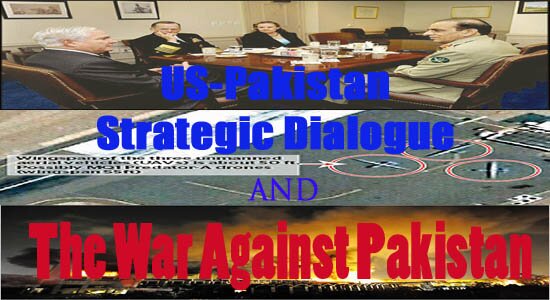
 Print This Post
Print This Post  Email This Post
Email This Post
Pakistan Tells US To Stop Supporting Insurgents Inside Pakistan
IMPORTANT: This report, first published in August 2008, is reproduced here to provide context to the determined Pakistani military operation against terrorists coming from Afghanistan. Pakistan’s largest English-language daily, The News, ran this on its front page, written by Kamran Khan, an investigative reporter who has worked for The Washington Post. The mainstream Am-Brit media continues to ignore this story and keeps the American and the British public unaware of the double game that their governments are playing in our region. Two senior U.S. military officials who secretly visited Pakistan in July 2008 faced tense moments when former President Musharraf, Army Chief Gen. Kayani and the ISI chief at the time confronted them with evidence that portrayed a pattern of American support for separatist, sectarian and religious terrorism inside Pakistan with help from Indian intelligence operatives based in major Afghan cities. The two embarrassed Americans, Chairman Joint Chiefs of Staff Adm. Mike Mullen and CIA Deputy Director Stephen R. Kappes, came to lecture Pakistanis on what role ISI should play but ended up receiving an earful. It is a rare inside story of how Islamabad confronted Washington about what appears to be a clear case of betrayal, where Washington conspired with Karzai and the Indians against its own staunch ally.
KAMRAN KHAN | 5 August 2008 | 2008 | The News International
WWW.PAKNATIONALISTS.COM
KARACHI, Pakistan—Pakistan has complained to United States military leadership and the Central Intelligence Agency’s involvement with terrorism inside Pakistan was inconsistent with Washington’s declared commitment to the war against terror.
Impeccable official sources have said that strong evidence and circumstantial evidence of American acquiescence to terrorism inside Pakistan was outlined by President Pervez Musharraf, Chief of Army Staff General Ashfaq Pervez Kayani and Director General Inter Services Intelligence (ISI) Lt. Gen. Nadeem Taj in their separate meetings with US Chairman Joint Chiefs of Staff Admiral Michael Mullen and CIA Deputy Director Stephen R Kappes on July 12 in Rawalpindi.
The visit by the senior US military official along with the CIA deputy director — carrying what were seen as India-influenced intelligence inputs — hardened the resolve of the Pakistani establishment to keep supreme Pakistan’s national security interest even if it meant straining ties with the U.S. and NATO.
A senior official with direct knowledge of these meetings said that Pakistan’s military leadership and the president asked the American visitors “not to distinguish between a terrorist for the United States and Afghanistan and a terrorist for Pakistan.”
For reasons best known to Langley, the CIA headquarters, and the Pentagon, Pakistani officials say the Americans were not interested in disrupting the Kabul-based fountainhead of terrorism in Balochistan nor do they want to allocate unmanned Predators to eliminate Baitullah Mehsud, the undisputed kingpin of suicide bombings against Pakistan who currently hiding near the Pak-Afghan border.
The most intriguing moment for the two senior U.S. officials while visiting Rawalpindi was when their Pakistani hosts presented them with evidence of American link to terrorists in Balochistan. Pakistani officials proved Brahmdagh Bugti’s presence in Afghan intelligence safe houses in Kabul, his photographed visits to New Delhi and his orders for terrorism in Balochistan.
The top U.S. military commander and the CIA official were also asked why the CIA-run Predators and the U.S. military did not swing into action when they were provided the exact location of Baitullah Mehsud, Pakistan’s most wanted terrorist and the mastermind of almost every suicide attack against the Pakistan Army and the ISI since June 2006.
One such precise piece of information was made available to the CIA on May 24, 2008, when Baitullah Mehsud drove to a remote South Waziristan mountain post in his Toyota Land Cruiser to address the press and returned back to his safe abode. The United States military has the capacity to direct a missile to a precise location at very short notice as it has done close to 20 times in the last few years to hit al-Qaeda targets inside Pakistan.
Pakistani official have long been intrigued by the presence of highly encrypted communications gear with Baitullah Mehsud. This communication gear enables him to collect real-time information on Pakistani troop movement from an unidentified foreign source without being intercepted by Pakistani intelligence.
Admiral Mullen and the CIA official were in Pakistan on an unannounced visit on July 12 to show what the U.S. media claimed was evidence of ISI’s ties to Afghan Taliban commander Maulana Sirajuddin Haqqani and the alleged involvement of Pakistani agents in the bombing of the Indian embassy in Kabul.
Pakistani military leaders squarely dismissed the American information and evidence on the Kabul bombing. Instead, the Pakistani officials explained why it was necessary for Islamabad to maintain some form of communication with Haqqani, just as the British government had decided to open talks with some Taliban leaders in southern Afghanistan last year.
Before opening new channels of communication with the Taliban in Helmand province in March this year, the British and Nato forces were talking to leading Taliban leaders through Michael Semple, the acting head of the European Union mission to Afghanistan, and Mervyn Patterson, a senior UN official, before their unprecedented expulsion from Afghanistan by the Karzai government in January this year.
The American visitors were also told that the government of Pakistan had to seek the help of Taliban commanders such as Sirajuddin Haqqani for the release of its kidnapped ambassador Tariquddin Aziz, after the U.S.-backed Karzai administration failed to secure Aziz’s release from his captors in Afghanistan.
Admiral Mullen and Kappes were both provided information about the activities of the Indian consulates in Kandahar and Jalalabad and were asked how the CIA does not know that both Indian consulates are manned by Indian intelligence agents who plot against Pakistan round the clock.
“We wanted to know when our American friends would get interested in tracking down the terrorists responsible for hundreds of suicide bombings in Pakistan and those playing havoc with our natural resources in Balochistan while sitting in Kabul and Delhi,” said a Pakistan official privy to the meetings.
Throughout their meetings, the Americans were told that Pakistan would like to continue its role as an active partner in the war against terror and at no cost would it allow its land to be used by our people to plot terror against Afghanistan or India. However, Pakistan would naturally want the United States, India and Afghanistan to stop supporting Pakistani terrorists.
Pakistani officials have said that the current ‘trust deficit’ between the Pakistani and U.S. security establishments is not serious enough to lead to severing the relationship, but that the element of suspicion is very high, more so because of CIA’s decision to publicize the confidential exchange of information with Pakistan and to use its leverage with the new Pakistani government to try to arm-twist the Army and the ISI.
The Pakistani security establishment, officials said, want a fresh round of strategic dialogue with their counterparts in the U.S., essentially to priorities the objectives and terrorist targets in the war against terror, keeping in mind the serious national security interests of the two allies.
Published by The News International. All rights reserved.
© 2007-2010. All rights reserved. PakNationalists.com
Verbatim copying and distribution of this entire article is permitted in any medium
without royalty provided this notice is preserved.







Leave a Reply